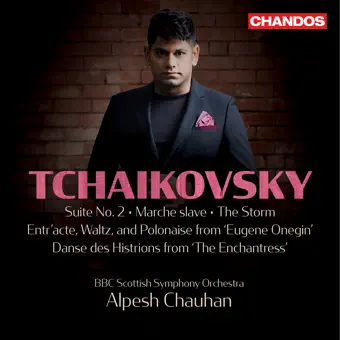augustus 2025
Tchaikovsky: Orchestral Works, Vol. 3
BBC Scottish Symphony Orchestra o.l.v. Alpesh Chauhan
Minder uitgevoerde Tsjaikovski – maar nadat je naar Alpesh Chauhan en de fantastische pleidooien van BBC Scottish SO hebt geluisterd, vraag je je af waarom!

Deze cd verleidt de luisteraar vanaf het begin. Tedere violen omarmen je met warme smeekbeden en de houtblazers antwoorden met zachte echo's, elke frase welsprekend en recht uit het hart. Het is jammer dat Tsjaikovski's Suite nr. 2 zelden wordt uitgevoerd, maar de BBC Scottish SO onder leiding van Alpesh Chauhan doet er alles aan om het stuk op je playlist te krijgen. Tsjaikovski zou eigenlijk een pauze nemen voor zijn gezondheid, weg van de druk van het componeren, maar besloot dat een nieuwe orkestsuite hem geen kwaad zou doen. De suite valt halverwege zijn Symfonieën nr. 4 en 5, dus we zouden het kunnen beschouwen als een ontspannen Symfonie nr. 4. Er zijn nieuwe orkestcombinaties en vreemde contrasten in het eerste deel, getiteld 'Jeu de sons' ('Klankspel'). Hij liet zijn fantasie de vrije loop in 'Kinderdromen', dat enkele prikkelende voortekenen van De Notenkraker bevat. In de vurige finale vermaakte Tsjaikovski zich met een parodie op een andere Russische componist uit die tijd, met als ondertitel 'Wilde Dans in de stijl van Dargomizjski'. Chauhan geniet duidelijk van de klankwerelden die Tsjaikovski voor het orkest creëert, waarbij hij elke instrumentgroep laat zien en tegenmelodieën benadrukt, wetende dat hij kan vertrouwen op de expertise van de Chandos-geluidstechnici. Zelfs in de wildste Dargomizjski-momenten blijft de muziek beheerst, gracieus en aristocratisch. Het BBC SSO biedt alle levendige kleuren die Tsjaikovski wenste, inclusief de verrassende aanwezigheid van accordeons in het Scherzo!
De Suite nr. 2 is de grootste attractie van de cd, maar hetzelfde scherpe stijlgevoel is overal aanwezig. De Entr'acte, de Wals en de Polonaise van Jevgeni Onegin worden vakkundig uitgevoerd, vooral in de minutieuze aandacht voor frasering in de Wals. De ‘Danse des histrions’ (skomorokhi – volksartiesten) uit De Tovenares is een perfect voorbeeld van Tsjaikovski's vermogen om van ‘lage’ muziek iets elegants te maken zonder dat het in vulgaire verwaarlozing vervalt – zo brengt Chauhan het zeker. De Storm, een vroege orkestrale fantasie gebaseerd op een toneelstuk van Alexander Ostrovsky, werd fel bekritiseerd door Tsjaikovski's compositieleraar Anton Rubinstein, en het stuk werd tijdens het leven van de componist noch uitgevoerd noch gepubliceerd. Er zijn enkele intrigerende passages, maar ze vormen geen overtuigend geheel. Toch is het zeker de moeite waard om te beluisteren, en degenen die Tsjaikovski's Eerste symfonie, Winterdromen, kennen, staat een aangename verrassing te wachten. De Marcheslav is de kers op de taart voor liefhebbers van dit opzwepende stuk, geschreven voor de Serviërs tijdens hun strijd voor onafhankelijkheid van het Ottomaanse Rijk.
Dit is alweer de derde cd in Chauhans Tsjaikovski-serie met BBC SSO op Chandos. Hun ontdekkingsdrang en hun volledige toewijding aan Tsjaikovski moedigen ons aan om door te gaan met het project.

This disc seduces the listener from the outset. Tender violins embrace you with warm entreaties and the woodwind answer with gentle echoes, every phrase spoken eloquently and from the heart. It is a pity that Tchaikovsky’s Suite No 2 is seldom performed, but the BBC Scottish SO under Alpesh Chauhan do everything in their power to put the piece on your playlist. Tchaikovsky was supposed to be taking a break for his health, away from the pressures of composition, but decided that a new orchestral suite wouldn’t cause him any harm. It falls halfway between his Symphonies Nos 4 and 5, so we might think of it as an easy-going Symphony No 4. There are novel orchestral combinations and strange contrasts in the first movement, entitled ‘Jeu de sons’ (‘Sound-play’). He allowed his fantasy to run free in ‘Child’s Dreams’, which includes some tantalising anticipations of The Nutcracker. In the fiery finale, Tchaikovsky amused himself with a parody of another Russian composer of the period, subtitled ‘Wild Dance in the style of Dargomizhsky’. Chauhan clearly delights in the sound worlds that Tchaikovsky creates for the orchestra, showing off every group of instruments and highlighting countermelodies, knowing that he can rely on the expertise of the Chandos sound engineers. Even in the wildest Dargomizhskian moments, the music remains poised, graceful and aristocratic. The BBC SSO provide all the vivid colours Tchaikovsky wanted, including the startling appearance of accordions in the Scherzo!
The Suite No 2 is the disc’s main attraction but the same keen sense of style is present throughout. The Entr’acte and Waltz and the Polonaise from Eugene Onegin are deftly performed, especially in the meticulous attention to phrasing in the Waltz. The ‘Danse des histrions’ (skomorokhi – folk entertainers) from The Enchantress is a perfect illustration of Tchaikovsky’s ability to make something elegant from ‘low’ music without letting it lapse into vulgar abandon – this is certainly how Chauhan delivers it. The Storm, an early orchestral fantasy based on a play by Alexander Ostrovsky, was harshly criticised by Tchaikovsky’s composition teacher, Anton Rubinstein, and the piece was neither performed nor published during the composer’s lifetime. There are some intriguing passages but they do not cohere into a convincing whole. Still, it is well worth a hearing, and those who know Tchaikovsky’s Symphony No 1, Winter Daydreams, have a pleasant surprise in store. The Marche slave is a cherry on top of the cake for those who enjoy that rousing piece, written for the Serbs as they fought for independence from the Ottoman Empire.
This is already the third disc in Chauhan’s Tchaikovsky series with the BBC SSO on Chandos. Their spirit of exploration and their total commitment to Tchaikovsky leaves us urging them to continue with the project.
